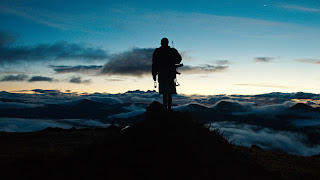François Ozon is a filmmaker who almost always comes up with something interesting. Some of his earlier works were associated with the New French Extremity, and for many years this prolific, mischievous director has seesawed between high frivolity (8 Women, Potiche) and more sombre concerns (5x2, Time to Leave). While sitting down to watch an Ozon film, you're pretty confident you'll find him working in one of these modes - or maybe even both, as in In the House and Young & Beautiful. His most recent film prior to By the Grace of God was Double Lover, which played almost as a self-parody: borderline transgressive, trashy and sloppy, it was a film which saw Ozon treading water as he went through the motions of adapting Joyce Carol Oates' 1987 novel Lives of the Twins. While admittedly rather fun, it was cookie-cutter Ozon which presented nothing especially new. But the throwaway Double Lover provided no hint as to what Ozon would do next: his latest film is a truly staggering work, one quite unlike anything else in the director's filmography.
As with the terrific Oscar-winner Spotlight, By the Grace of God is concerned with the Catholic Church abuse scandal, and Ozon is quite open about the similarities between the two films. However, By the Grace of God does differ from Tom McCarthy's movie, not least in that Ozon's film was made as the trial of one of its characters was still in progress; an unusual move, certainly, yet one which imbues the film with a sense of freshness and immediacy which is almost palpable. By the Grace of God was not only made while these court proceedings were underway, but the film itself was dragged into the courts as Bernard Preynat, the priest depicted in the film, attempted to block its release. Incredibly, this €6 million production was only cleared for release the day before it was due to hit cinemas. Indeed, the story of By the Grace of God's production would make for a gripping film in itself.
Ozon's film follows three grown men, all of whom were childhood victims of Preynat (Bernard Verley). The first chunk of the film is devoted to Alexandre (Ozon regular Melvil Poupaud), a calm family man who's shocked to learn that Preynat, under the Cardinal's protection, is still working with children. As a result of this discovery, Alexandre decides to take action, and a church psychologist arranges a meeting between victim and abuser, which is intended to aid the healing process. Preynat doesn't deny what happened, and while he seems pleased to see that Alexandre has grown up to be a well-adjusted member of society, the priest doesn't seem especially sorry for the crimes he committed, merely stating that they were the symptom of an illness; he's certainly not looking for forgiveness. The slightly surreal meeting ends with the truly sickening, horrifying sight of Alexandre being persuaded to take Preynat's hand as a concluding prayer is recited.
The more cautious Alexandre then gives way in the narrative to the headstrong François (Denis Ménochet), another victim, yet one who wants to cause maximum damage to the Church. Like Alexandre, François has grown up to become a content and fulfilled adult, yet his atheism drives him in a way which Alexandre - who still attends church with his young family - can't fully relate to. Nonetheless, Alexandre and François have more than enough in common as they look to take on Cardinal Barbarin (François Marthouret), who seems chiefly concerned with putting his institution's reputation ahead of its victims. The film's title comes from a quote from the Cardinal, who stated that it was "by the grace of God" that the statute of limitations precluded most of the abuse cases making it to court. Make of that what you will.
Emmanuel (Swann Arlaud), the third and last of the film's main characters to be introduced, is by far the most damaged of the Church's victims. Prone to seizures which are linked to the trauma of his abuse, the unemployed Emmanuel appears to have spent his entire adult life on his uppers, and lives in a shabby apartment with a girlfriend he constantly argues with. But through meeting Alexandre, François and other victims, Emmanuel gains a sense of purpose as this trio of very different men join forces in order to seek justice. While the three main actors are all terrific here, it's Arlaud who steals the film with a truly incendiary performance, with his Emmanuel representing the impact of the Church's crimes at its worst: for every Alexandre (or François) who managed to get on with their life, there are many Emmanuels out there, stuck in a rut, broken and forgotten - if they're still alive.
By the Grace of God is an immaculate, quietly devastating work which continues telling a story the world needs to hear. While someone might suggest you should just watch Spotlight instead as it covers a lot of similar ground, By the Grace of God's existence is hugely important, as it serves as a European angle on a problem which has affected many parts of the world; hopefully, there will be more films which highlight the Catholic Church abuse scandal in other territories. While it may well be Ozon's best film, By the Grace of God is also the least typical of the director's works, and his fingerprints are nowhere to be found here; it provides final proof, if any were needed, of this genre-hopping filmmaker's versatility. While normal service will most likely be resumed with his upcoming Eté 84 (which also stars Poupaud and has already finished shooting), this welcome departure for François Ozon is a vital, urgent work, and one of 2019's best films.
Darren Arnold
Images: image.net










